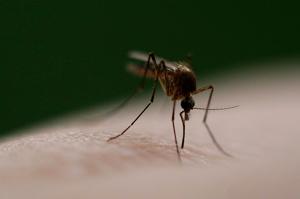Drug-resistant malaria in Cambodia
(Image: andylangager/Flickr)
The global fight against Malaria has been dealt what could be a major setback. Malaria is caused by a parasite that’s spread by mosquitoes. The disease kills more than a million people each year. The World Health Organization says one of the most important anti-malaria drugs may be losing its effectiveness. There are signs that the malaria parasite is developing resistance to the drug.
This worrisome news comes from the Southeast Asian nation of Cambodia. Health officials there are now trying to contain the problem before it spreads. "The World’s" Mary Kay Magistad reports from Samlot on the Thai-Cambodian border.
Samlot sits in a remote part of Camodia that, for 30 years, was controlled by the Khmer Rouge. That’s the group that killed about a quarter of the Cambodian population during their four-year reign in the late 1970s.
The most common kind of malaria around here is also the most dangerous. It’s called falciparum. Within days, it can cause a fever, coma, and death. After Neang Van survived a bout of facliparum, the Khmer Rouge sent him to medical school in China for five years to learn how to treat the disease.
Now, Dr. Neang Van works at a tiny rural hospital in the same area where he once fought as a soldier. He says malaria is still a big problem, and it’s hard to get his patients to take their medicine as they should. “Sometimes, they don’t like the smell of the medicine or they don’t like the side effects. So they stop taking the medicine, and they end up with an even bigger problem.” Taking anti-malaria medicine haphazardly allows the malaria parasite to become resistant.
Dr. Mark Fukuda heads the Department of Immunology and Medicine at the US Armed Forces Research Institute of Medical Science in Bangkok. He says the malaria parasites in northwestern Cambodia seem to be getting better and faster at figuring out how to resist each new anti-malaria drug that’s introduced.
“There are some theories that perhaps these parasites have become fixed in the population as a result of widespread exposure that occurred decades ago. And these are heartier parasites that have adapted to seeing drug being exposed to drug, and they become resistant more quickly.”
This time, the malaria parasite is becoming tolerant to one of the most affordable and, until now, effective anti-malaria drugs left. It’s called artemisinin.
Fukuda’s team and Cambodia’s National Malaria Center, have found that in some patients it’s taking longer for artemisinin to knock the malaria parasite out. And in a small number of patients, the parasite survives the drug and the same patient gets sick again days or weeks later.
The director of Cambodia’s National Malaria Center, Duong Socheat, says his center is working with international agencies on a project to fight this emerging resistant parasite. The idea of this containment project is to take pure artemesinin off the market for a couple of years so the parasites that have gotten used to it die off and new ones don’t develop the same tolerance.
A combination drug that includes artemesinin can still be used in most cases – but in pockets where the parasite is known to have become tolerant, artemisinin won’t be used at all. Instead, doctors will directly give affected villagers a much more expensive combination drug that includes malarone. Cambodia is getting help in this effort from the Bill & Melinda Gates Foundation. So villagers won’t have to pay for the malarone combination therapy.
There’s a challenge to the strategy of taking artemesinin off the market, and that’s mopping up the supply in freelance pharmacies. Shop owner Phan Neary says artemisinin is available almost everywhere in shops like hers. It’s a gritty little hole in the wall, an open air general store that sells coconuts and beer and shampoo. Pulling artemesinin from the shelf in places like this will be a monumental task, and Cambodia only has about a dozen health inspectors nationwide who are supposed to oversee such pharmacies.
Dr. Mark Fukuda says how you eliminate malaria is to spray for mosquitoes, distribute bed nets treated with insecticide, make the right drugs available and teach people how to take them correctly. “There’s nothing particularly magical about it. It will just require concerted effort on the part of authorities and resources until that last malaria parasite is eliminated.”
If that sounds like a big ambition, consider that malaria was endemic in the southern United States until just after World War II, when a concerted campaign wiped it out in less than five years. Meeting that same success in Cambodia will be difficult and expensive, especially given that it’s a poor country with inadequate infrastructure and too few trained public health workers. But if the effort succeeds, it could end this region’s role as a breeding ground for resistant malaria parasites that go on to plague the planet.
PRI’s "The World" is a one-hour, weekday radio news magazine offering a mix of news, features, interviews, and music from around the globe. "The World" is a co-production of the BBC World Service, PRI and WGBH Boston.
More "The World."
